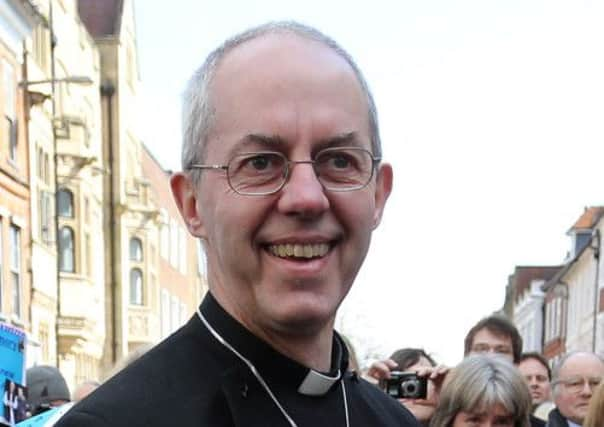Martin Dales: Testing task ahead for new Christian leaders


Today we see the Enthronement of the Most Reverend and Right Honourable Justin Welby as the 105th Archbishop of Canterbury following in the steps of St Augustine.
Both leaders have a huge amount on their respective plates as they start these new phases of their ministries.
Advertisement
Hide AdAdvertisement
Hide AdThe role of Archbishop of Canterbury is, frankly, an impossible one for any one person to fulfil.
In General Synod as long ago as 1999, we looked at how we resourced the Archbishops of Canterbury and York in the exercising of their ministries.
In 2002 the report “Resourcing Archbishops” chaired by Professor Anthony Mellows made the following observations on the first page: “It is remarkable what the Archbishops achieve with the limited resources available to them” and “the demands upon, and the expectations of, the Archbishops are at the very limit of what is realistic. The jobs are approaching the point at which they will become impossible.”
Eleven years later, very little has changed and those observations hold true and indeed are exacerbated by the way 21st century communications and 24/7 news coverage require instant comments at the drop of a hat from Archbishops and others in public life.
Advertisement
Hide AdAdvertisement
Hide AdSo what are the challenges facing Archbishop Welby as he takes on the mantle of Dunstan, Anselm, Becket, Cranmer, Temple, Ramsey, Coggan and Williams to name but a few of his predecessors? There is the unfinished business relating to women bishops, rejected by the General Synod last November as an unsatisfactory package of potentially discriminatory proposals.
The matter of same-sex relationships continues to exercise minds both in the Church and Parliament, with the re-definition of the word “marriage” being at the heart of it.
My dictionary defines marriage as “the legal union of a man and a woman in order to live together and often to have children” which seems to me fairly unequivocal and upholds the teaching of most Churches.
As well as his own Diocese of Canterbury, there is the pastoral care of the family of 78 million Christians that make up the Anglican Communion worldwide: these are churches that are “in communion with the See of Canterbury in the Church of England, and thus the Archbishop of Canterbury, in his person and ministry, is the unique focus of Anglican unity”.
Advertisement
Hide AdAdvertisement
Hide AdAs in any family, whether here in England, in the wider Communion or in the universal Church, there are good times and bad, happy and sad, agreements and disagreements and Archbishop Justin’s honed skills in reconciliation will come into their own in helping us all deal with the issues that Christians face living out the Gospel wherever they are.
Perhaps the most pressing item on Archbishop Justin’s agenda is to address the dwindling number of people attending churches in England. It is not so much that people don’t believe in God or have no faith but instead a general apathy and lack of any desire to join ‘the club’. It is not only churches who are suffering a lack of membership but many organisations who find competition from the modern age with all its ephemerality.
Today in the Church of England, we remember the 6th century Abbot St Benedict and also the 16th century Archbishop of Canterbury, Thomas Cranmer. Benedict wrote what became known as the Rule of St Benedict, a living out of the Gospel of Christ in community as relevant now as when it was first written. Archbishop Justin is a 21st Century Oblate of the Order of St Benedict in the Anglican tradition, as am I, and in Yorkshire we are blessed by the presence of our Roman Catholic Benedictine friends at Ampleforth Abbey.
Cranmer wrote the Book of Common Prayer and the 39 Articles which remain part of what the Church of England continues to believe. Archbishop Justin has already been outspoken with the Government about the care of the poor and needy and Pope Francis holds similar views it seems.
Advertisement
Hide AdAdvertisement
Hide AdCranmer was executed as a heretic for his views: being an Archbishop in 2013 continues to be a sacrificial appointment from many perspectives.
But in the words of St Ignatius of Loyola, whose spirituality influences both Pope and Archbishop, there lies their job specification:
Teach us, good Lord, to serve Thee as Thou deservest:
To give and not to count the cost;
To fight and not to heed the wounds;
To toil and not to seek for rest;
To labour and not to ask for any reward
Save that of knowing that we do Thy will.